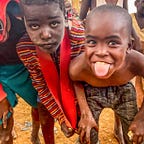Holding those in power to account in Somalia
By Kiin Hassan Fakat, reporter, Bilan Media
11 April 2024 | Mogadishu
The time has whizzed by so fast that it’s hard to believe Bilan is two years old today.
At the same time, it’s hard to believe we have achieved so much in such a short time.
We have gone from being six young female Somali journalists struggling to make a living and to get our voices heard to being a fully-fledged media house reporting for Somali and international outlets including the BBC, The Guardian, Toronto Star, TRT Afrika and El Pais.
Two years ago, I was a reporter for a regional media group in Kismayo, southern Somalia. I had no technical knowledge and no editorial power.
Today, I do everything from choosing what stories to cover, filming them, editing them and writing them in Somali and English. I live in the capital Mogadishu. I have reported from COP, I have done an internship at Kenya’s Nation Media Group and I have travelled across Somalia to tell stories from unreported parts of the country. My life has completely changed.
Some leading global media organisations are now approaching Bilan to cover major international stories such as the recent devastating drought and floods in Somalia. They trust us, they rely on us and they know that, unlike foreign correspondents who are parachuted in when disaster strikes, we know the context and the nuances. We can get to the heart of the story rather than relying on international aid agencies to show us what they want us to see and heavily armed security outfits to tell us where we can and cannot go.
That’s why, in addition to reporting on the general horror of the floods from the ground in three parts of Somalia for The Guardian, we decided to do a separate story for El Pais on a camp for displaced, disabled people which was cut off from aid groups because it was in a crater-like depression which filled with so much water it resembled a lake.
As we choose what subjects we want to cover, we are opening up a different Somalia to local and international audiences. Somalis, especially women and the youth, have told us Bilan is providing them with role models, both in terms of showing them that young women can have successful careers in a challenging, male-dominated field and by broadcasting stories about people who inspire them and give them the courage to be who they want to be.
For instance, we have reported on a young female engineer who set up her own construction company, a young man who lifted himself out of unemployment by carving charming boats and other objects from found pieces of wood and another person who returned from abroad to set up a barista school.
Perhaps because we have faced so many challenges ourselves and continue to encounter prejudice for working as journalists, our team is focused on giving voices to the voiceless. We talk to those usually shunned by society including orphans, people with mental health problems, women with fistulas, drug addicts and those suffering from HIV and AIDS. A BBC report we did on people living with albinism made a big global impact, with offers of help coming from all over the world.
A story we did on a headmistress who broke new ground by introducing period education to girls in her school went viral as menstruation is a taboo subject in Somalia, even between mothers and daughters.
The debates our stories provoke were part of the reason we decided to start a monthly talk show where at least 50 per cent of the panel is made up of women, and girls and women make up a large part of the audience. We have tackled contentious topics such as the critical shortage of female teachers, the challenges faced by women trying to get into politics and the issue of period education.
A key part of our mission is holding those in power to account. Following our reports, the Somali authorities said they would do something to help those suffering from HIV and opioid addiction; and that they would introduce period education in schools. We will keep asking whether they have taken action and if not, why not.
A major plan for Bilan in year three is to expand into the Federal Member States by equipping and training female journalists across the country so they can report from the regions for national and international media. This will help shift the focus of journalism from the capital, Mogadishu.
We have had the privilege of being mentored by top people in their field and want to pass on what we have learned to regional Somali journalists. We also do this via our internship programme.
Our name Bilan means ‘shining a light’ and that’s exactly what we do. We tell previously untold stories, we challenge stereotypical media approaches to Somalia and our journalism shows that not all reporting has to be about bad news. We have also shone a light on the fact that women journalists are equal to their male counterparts, and have a unique ability to gain access to and report on those usually ignored by the media.
Kiin Hassan Fakat is a reporter at Bilan, Somalia’s first all-women media team, which is funded by the European Union through UNDP and hosted by Dalsan Media Group in Mogadishu.
Read more about how UNDP Somalia is supporting the people and the Government of Somalia: www.undp.org/somalia
